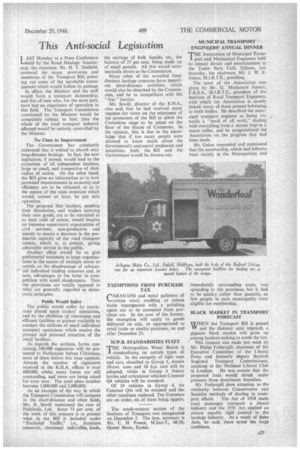This Anti-social 1.-egista tion
Page 27

If you've noticed an error in this article please click here to report it so we can fix it.
LAST Monday at a Press Conference held by the Road Haulage Association, the chairman, Mr. H. T. Dutfield, reviewed the scope, provisions and intentions of the Transport Bill, pointing out some of the inevitable consequences which would follow its passage.
In effect, the Minister and his staff would form a transport dictatorship, and this of men who, for the most part, have had no experience of operation in this field. The Transport Commission constituted by the Minister would be completely subject to him; thus the whole of the road transport industry affected would be entirely controlled by the Minister.
No Clues to Improvement
The Government has constantly reiterated that it wished to absorb only long-distance haulage. In fact, the new legislation, if passed, would lead to the extinction of all independent hauliers, large or small, and irrespective of their radius of action. On the other hand, the Bill gives no information as to how promised improvements in economy and efficiency are to be obtained, or as to the nature of the rates structure which would, sooner or later, be put into operation.
The proposal that hauliers, pending their dissolution, and traders carrying their own goods, are to be restricted as to their radii of action, would involve an immense supervisory organization of civil servants, non-productive and merely to ensure a decrease in the productive capacity of the road transport system, which is, at present, giving admirable service to the public.
Another effect would be to give preferential treatment to large organira • tions in the nature of multiple stores or cartels, to the disadvantage of substantial individual trading concerns and, in turn, advantages to the latter in competition with small shopkeepers. Thus the provisions are totally opposed to what are generally regarded as democratic principles.
Public Would Suffer The public would suffer by restric tions placed upon traders' operations, and by the abolition of convenient and efficient facilities at present available to conduct the millions of small individual transport operations which receive the prompt and personal attention of the small hauliers.
As. regards the petition, forms con
taining .360,000 signatures will be presented to Parliament before Christmas, most of them before this issue appears. Already the number of signatures received at the R.H.A. offices is over 600,000, whilst many forms are still outstanding, and more are being asked for even now. The total pleas number between 1,000,000 and 2,000,000.
As an example of the way in which the Transport Commission will compete in the short-distance and other fields, Mr. R. Sewill mentioned the case of Pickfords, Ltd. Some 73 per cent, of the work of this concern is at present what in . the Bill is included under "Excluded Traffic," i.e., furniture removals, abnormal indivisible, loads,
the carriage of bulk liquids, etc., the balance of 27 per cent. being made up of small parcels. All this would automatically divert to the Commission.
Many other of the so-called longdistance haulage concerns have important short-distance activities, which woulci also be absorbed by the Commission, and be in competition with the "free" haulier.
Mr. Sewill, director of the R.H.A., also said that he had received many requests for views on the reluctance of the promoters of the Bill to allow the Committee stage to be taken on the floor of the House of Commons. In his opinion, this is due to the knowledge that if too many people were allowed to know much about the Government's anti-social tendencies and intentions, both the Bill and the Government would be thrown out.




































































